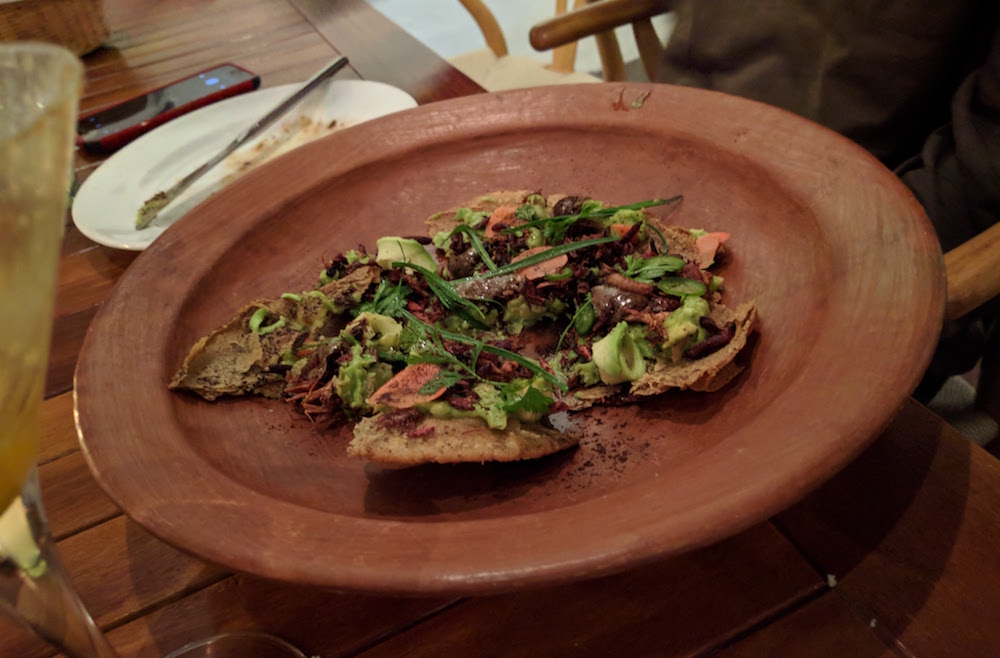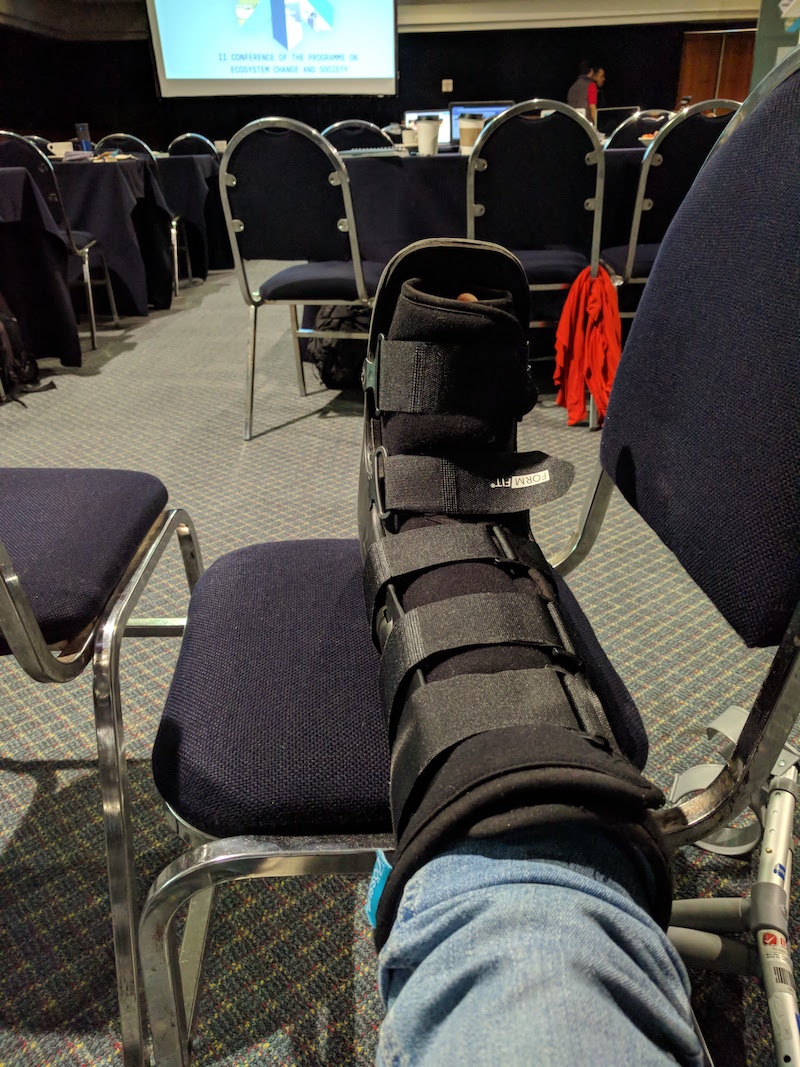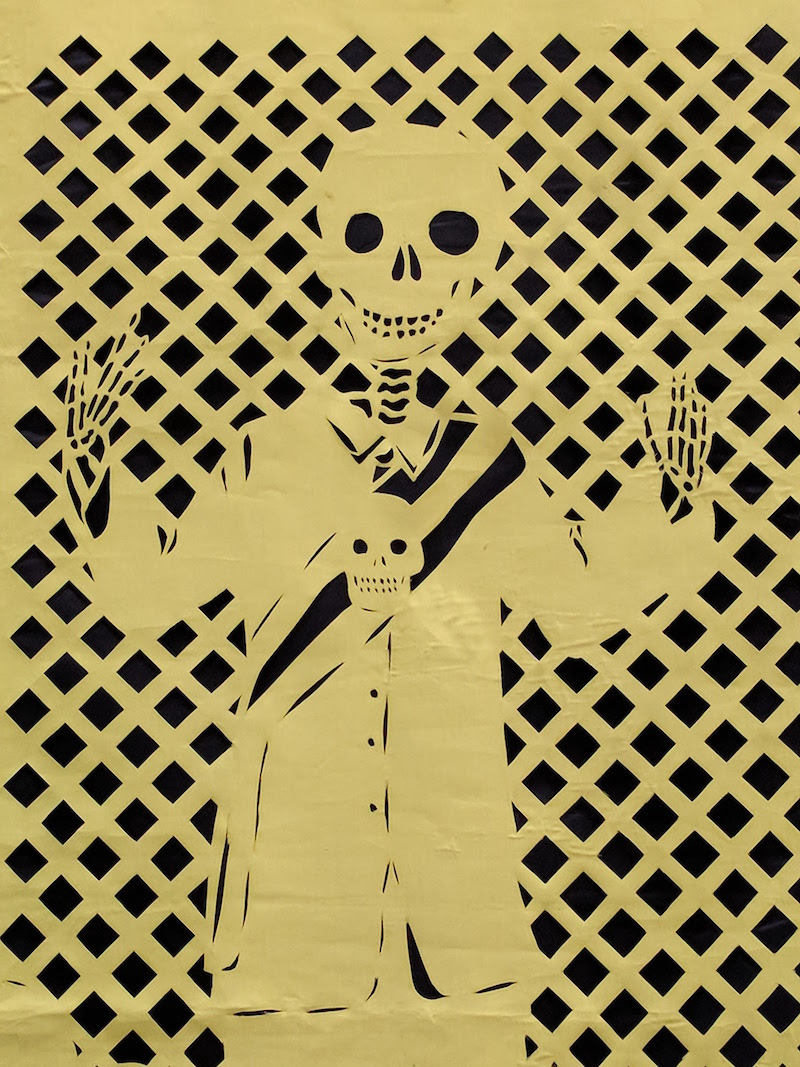My “learning journey” journal in Mexico
It is not often that researchers make a risk and opportunity assessment in their day-to-day life. But that was the case in my decision to attend the second conference of the Programme on Ecosystem Change and Society (PECSii) in Oaxaca City, Mexico. Just the name Oaxaca summons a mix of feelings around culture, biodiversity, history and food. For that reason, the conference, focused on “place-based transdisciplinary research for global sustainability,” had a perfect venue in this historical city. Not everything worth doing is easy, as my old friend “Murphy” was so kind as to remind me. Therefore, I attended PECSii wearing a moon boot and successfully wielding a pair of crutches to propel me through the conference activities and the delights of the city. Despite this small hiccup, as the conference got going so too did the discussions, sharing and, importantly, the learning.

A plate of grasshoppers served up a local restaurant. Photo: Claudia Munera Roldan
Here are some of the lessons I took away from this event:
The issue of (knowledge) governance: Is “Glocal” taking on a new meaning?
One of the ultimate goals of the scientific community and many of the researchers attending this conference is to link scientific information in order to inform sustainability policies. As always, this is easier said than done: frequently complicated by multiple and complex pathways, where different narratives and perceptions from the researchers and policy-makers are in conflict. One solution that some researchers have proposed for addressing these challenges has been the use of knowledge co-production, or collaborative, participative and transdisciplinary processes that help connect different types of knowledge in order to empower better decision-making.
Over the week, there were many presentations (and even a workshop) regarding how the sustainability community can use knowledge co-production to find a shared language within and between the diverse and complex worlds of the many people and communities who are involved in making decisions and delivering change. We had a peek into a variety of case studies for such approaches from all over the world, including many drawn from local Mexican experiences. Despite the various problems that these examples addressed, they shared a common thread of looking to build solutions by addressing the needs of local people embedded in complex decision-making contexts. As co-production is one of my favorite topics, I was delighted to learn from all of these case studies.

Munera Roldan poses with her moonboot during the conference. Photo: Claudia Munera Roldan
During the conference, participants raised many questions about how to connect voices and knowledge that exist at the local level (place-based, such as in towns) to higher levels (a nation or the global community). A recurrent issue raised in many sessions was about “power” in relation to decision-making and action. How relevant is local knowledge for decisions at a higher level? Who has the power to make decisions and influence policies at higher level that will have an effect on local communities? These are not simple questions, and it is unlikely that there is a single or simple answer. What these case studies collectively highlighted is that it is high time that we start defining better what the meaning of power is, and actively work to understand how decisions are made across scales (from local upwards) in order to better connect these worlds. This requires understanding the institutional context and geographic and cultural differences that affect the way conservation and sustainability knowledge is created, shared, understood and translated into decisions.
Protected areas, values and governance challenges
As a conservation biologist, I was interested to learn about projects focusing on protected areas, governance and ecosystem services. I was not disappointed with the variety of sessions and presentations focusing on these ideas. I welcomed discussions on how to better understand and allocate a value on ecosystem services and benefits provided by protected areas (session chaired by Alta de Vos). This started a conversation on how we can integrate different kinds of knowledge to achieve this goal. In our Australian National University session on governance challenges for protected areas, my colleagues and I talked about connecting the different realms of “Values – Rules and Knowledge” (VRK) that frame governance arrangements in order to understand how decisions get made through knowledge governance, climate science and values to support management of protected areas in uncertain futures.
Although I felt that these initial sessions on valuation provided a good start, I wanted the conversation to go further. Luckily for me, Sanders Jacob of the Research Institute for Nature and Forest (INBO) in Belgium gave a speed talk advocating a cautionary message regarding how researchers go about eliciting values in natural resources management. This presentation opened up the dialogue and posed the question: Whose values are more relevant for conservation and management? Protected areas offer a useful arena in which to connect multi-level decision-making challenges, from local to higher levels, while also considering the variety of perceptions and knowledge of the different stakeholders and people who depend on those areas.
Despite these great sessions and presentations, for me, the star of the conference was the theme on marine protected areas and the many presentations concerned with the challenges facing marine conservation. So is blue the new black? I am glad to see this happening and am sure that there will be a lot of work to do in this field in the years ahead.

A skeleton figure associated with the Día de los Muerto, which takes place every 1 November. Photo: Claudia Munera Roldan
What to expect?
Considering the multiple factors that drive change, and that affect sustainable development, how can we start connecting the dots for a more inclusive world without compromising natural ecosystems? There are ongoing initiatives focused on doing just that, including processes to strengthen a Knowledge-Action Network on nature and society (Natural Assets – where do science and society need to go?) that colleagues from Future Earth spoke about during a workshop at the conference.
During discussions, we shared many ideas and suggestions for how this Knowledge-Action Network could look, what kind of voices would be relevant to its aims and possible areas of future research and collaboration. I am really looking forward to hearing a debrief following from this dialogue. Other initiatives, such as a workshop from the Transformative Adaptation Research Alliance (TARA) chaired by Matt Colloff, also provided an opportunity to exchange ideas related to social transformation, while reflecting on future challenges based on our current experiences.
Final reflection
My week in Mexico gave me time to reflect on some of my earlier life and professional experiences. When I was living in Guatemala some years ago, I had the opportunity to work as a capacity building technician in the country’s protected areas system. Forget about postgraduate schooling, working for a government agency could be one of the best training opportunities you may ever have (sometimes frustrating, yes, but nonetheless enriching), as you learn about all the complex processes around conservation policy-making. At PECSii I was able to reflect on this experience, on what I learned in Guatemala and how this has been useful for my current research with the Luc Hoffmann Institute Conservation Futures project in Colombia. The journey has been long and difficult but productive (in my opinion), and there are many pages pending for me to fill out in my journal of lifelong and ongoing learning.
In spite of the practical challenges associated with attending the conference with a broken foot, I don’t regret my decision to travel to Oaxaca at all. The opportunity to learn about different approaches to conservation and revisit some concepts while making new friends and meeting old ones was not one that I would have passed up for the world. Thanks, Mexico!
DATE
December 14, 2017AUTHOR
Claudia Munera RoldanSHARE WITH YOUR NETWORK
RELATED POSTS
Spotlight on LMICs – Tired of Breathing in Pollutants? Time for Better Fuel Economy and Vehicle Standards
Future Earth Taipei Holds 2024 Annual Symposium
Spotlight on LMICs – The Future’s Juggernaut: Positioning Research as Anchors for Environmental Health